Deck 9: Benzene and Its Derivatives
Question
Question
Question
Question
Question
Question
Question
Question
Question
Question
Question
Question
Question
Question
Question
Question
Question
Question
Question
Question
Question
Question
Question
Question
Question
Question
Question
Question
Question
Question
Question
Question
Question
Question
Question
Question
Question
Question
Question
Question
Question
Question
Question
Question
Question
Question
Question
Question

Unlock Deck
Sign up to unlock the cards in this deck!
Unlock Deck
Unlock Deck
1/48
Play
Full screen (f)
Deck 9: Benzene and Its Derivatives
1
Substitution of a bromine atom for a hydrogen atom in anthracene leads to the formation of how many C14H9Br isomers?
A) 1
B) 2
C) 3
D) 4
A) 1
B) 2
C) 3
D) 4
3
2
Which of the following are intermediates in the mechanism of the reaction of phenol and acetone in the presence of phosphoric acid (a strong mineral acid)?
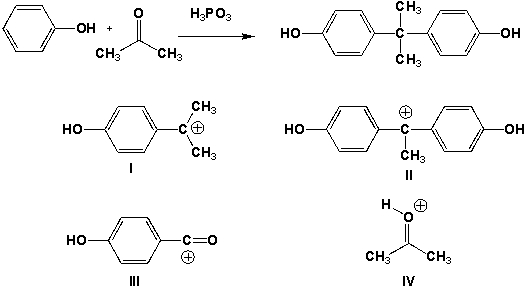
A) I and IV
B) II and III
C) III and IV
D) II and IV

A) I and IV
B) II and III
C) III and IV
D) II and IV
I and IV
3
What is the major contributing structure to the cation intermediate of the bromination of anisole?
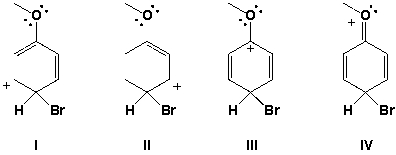
A) I
B) II
C) III
D) IV

A) I
B) II
C) III
D) IV
IV
4
Which is the electrophile in the following reaction?


A) I
B) II
C) III
D) IV


A) I
B) II
C) III
D) IV

Unlock Deck
Unlock for access to all 48 flashcards in this deck.
Unlock Deck
k this deck
5
How many Kekule structures are possible for benzene, naphthalene, and anthracene ?

A) I: 3, II: 4, III: 4
B) I: 2, II: 3, III: 4
C) I: 2, II: 4, III: 4
D) I: 3, II: 3, III: 4

A) I: 3, II: 4, III: 4
B) I: 2, II: 3, III: 4
C) I: 2, II: 4, III: 4
D) I: 3, II: 3, III: 4

Unlock Deck
Unlock for access to all 48 flashcards in this deck.
Unlock Deck
k this deck
6
Which is the major product of the following reactions?

A) para-chlorobenzoic acid
B) meta-chlorobenzoic acid
C) a mixture of para- and meta-chlorobenzoic acid
D) a mixture of ortho- and para-chlorobenzoic acid

A) para-chlorobenzoic acid
B) meta-chlorobenzoic acid
C) a mixture of para- and meta-chlorobenzoic acid
D) a mixture of ortho- and para-chlorobenzoic acid

Unlock Deck
Unlock for access to all 48 flashcards in this deck.
Unlock Deck
k this deck
7
How many -orbital electrons are in the following molecules?
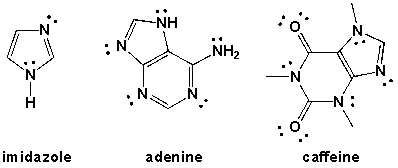
A) imidazole: 5, adenine: 10, caffeine: 5
B) imidazole: 6, adenine: 9, caffeine: 6
C) imidazole: 6, adenine: 10, caffeine: 6
D) imidazole; 4, adenine, 9, caffeine, 5

A) imidazole: 5, adenine: 10, caffeine: 5
B) imidazole: 6, adenine: 9, caffeine: 6
C) imidazole: 6, adenine: 10, caffeine: 6
D) imidazole; 4, adenine, 9, caffeine, 5

Unlock Deck
Unlock for access to all 48 flashcards in this deck.
Unlock Deck
k this deck
8
Which structures are aromatic? Make your call based on the electron distributions shown here, not on possible resonance structures.
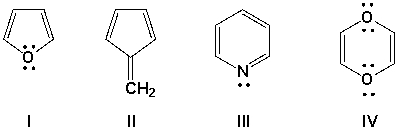
A) II, III
B) III, IV
C) I, III
D) I, IV

A) II, III
B) III, IV
C) I, III
D) I, IV

Unlock Deck
Unlock for access to all 48 flashcards in this deck.
Unlock Deck
k this deck
9
Arrange the compounds in order of decreasing reactivity towards the aromatic nitration reaction.
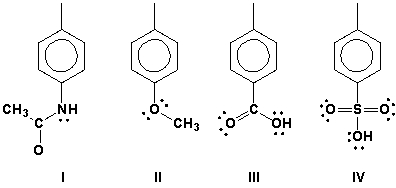
A) II > III > IV > I
B) III > II > I > IV
C) II > I > III > IV
D) IV > II > III > I

A) II > III > IV > I
B) III > II > I > IV
C) II > I > III > IV
D) IV > II > III > I

Unlock Deck
Unlock for access to all 48 flashcards in this deck.
Unlock Deck
k this deck
10
Which is the electrophile in the nitration of benzene?

A) I
B) II
C) III
D) IV

A) I
B) II
C) III
D) IV

Unlock Deck
Unlock for access to all 48 flashcards in this deck.
Unlock Deck
k this deck
11
Substitution of a bromine atom for a hydrogen atom in naphthalene leads to the formation of how many C10H7Br isomers?
A) 1
B) 2
C) 3
D) 4
A) 1
B) 2
C) 3
D) 4

Unlock Deck
Unlock for access to all 48 flashcards in this deck.
Unlock Deck
k this deck
12
Which is the major product of the following reaction?

A) 1-chloro-4-nitrobenzene
B) 1-chloro-3-nitrobenzene
C) 1-chloro-2-nitrobenzene
D) a mixture of 1-chloro-4-nitrobenzene and 1-chloro-2-nitrobenzene

A) 1-chloro-4-nitrobenzene
B) 1-chloro-3-nitrobenzene
C) 1-chloro-2-nitrobenzene
D) a mixture of 1-chloro-4-nitrobenzene and 1-chloro-2-nitrobenzene

Unlock Deck
Unlock for access to all 48 flashcards in this deck.
Unlock Deck
k this deck
13
Which are the final reaction products (2), which are formed by the following sequence of reactions.?
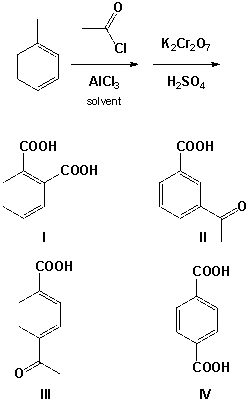
A) I and II
B) III and IV
C) I and IV
D) II and III

A) I and II
B) III and IV
C) I and IV
D) II and III

Unlock Deck
Unlock for access to all 48 flashcards in this deck.
Unlock Deck
k this deck
14
Which of the named compounds have correct structures?
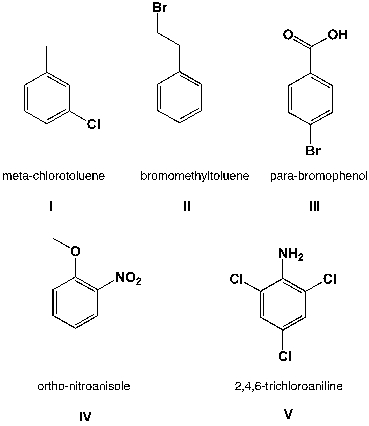
A) I, II, IV
B) I, III, IV
C) I, IV, V
D) II, III, V

A) I, II, IV
B) I, III, IV
C) I, IV, V
D) II, III, V

Unlock Deck
Unlock for access to all 48 flashcards in this deck.
Unlock Deck
k this deck
15
Which are the major reaction products of the following reaction, which is carried out in an inert solvent?
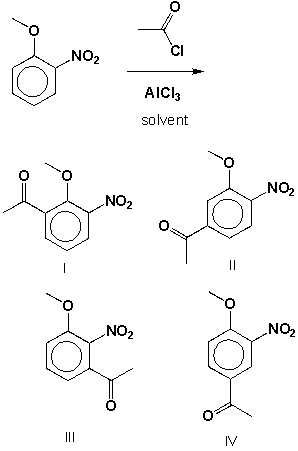
A) I and II
B) III and IV
C) I and IV
D) II and III

A) I and II
B) III and IV
C) I and IV
D) II and III

Unlock Deck
Unlock for access to all 48 flashcards in this deck.
Unlock Deck
k this deck
16
Arrange the compounds in order of increasing reactivity toward electrophilic aromatic substitution (lowest first).
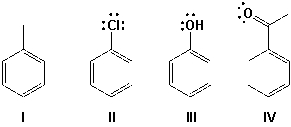
A) III, II, I, IV
B) IV, II, I, III
C) III, I, II, IV
D) IV, II, III, I

A) III, II, I, IV
B) IV, II, I, III
C) III, I, II, IV
D) IV, II, III, I

Unlock Deck
Unlock for access to all 48 flashcards in this deck.
Unlock Deck
k this deck
17
Arrange the compounds in order of increasing reactivity toward electrophilic aromatic substitution (lowest first).
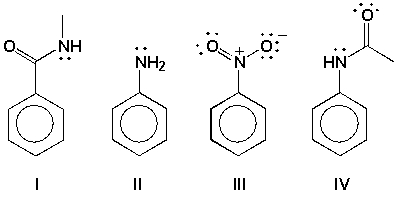
A) III < I < IV < II
B) I < III < II < IV
C) II < I < IV < III
D) III < II < I < IV

A) III < I < IV < II
B) I < III < II < IV
C) II < I < IV < III
D) III < II < I < IV

Unlock Deck
Unlock for access to all 48 flashcards in this deck.
Unlock Deck
k this deck
18
Which are the major reaction products of the following reaction, which is carried out in an inert solvent?
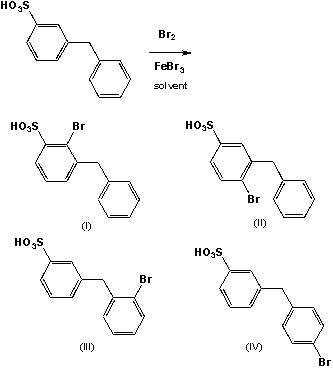
A) I and II
B) II and III
C) III and IV
D) II and IV

A) I and II
B) II and III
C) III and IV
D) II and IV

Unlock Deck
Unlock for access to all 48 flashcards in this deck.
Unlock Deck
k this deck
19
Which structures have the correct IUPAC names?
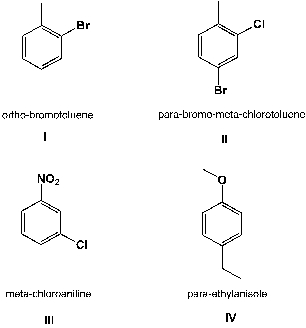
A) I, II
B) III, IV
C) I, IV
D) II, III

A) I, II
B) III, IV
C) I, IV
D) II, III

Unlock Deck
Unlock for access to all 48 flashcards in this deck.
Unlock Deck
k this deck
20
Substitution of a bromine atom for a hydrogen atom in benzene leads to the formation of how many different C6H5Br isomers?
A) 1
B) 2
C) 3
D) 4
A) 1
B) 2
C) 3
D) 4

Unlock Deck
Unlock for access to all 48 flashcards in this deck.
Unlock Deck
k this deck
21
The reagent that completes the following reaction is
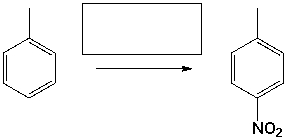


Unlock Deck
Unlock for access to all 48 flashcards in this deck.
Unlock Deck
k this deck
22
When one mole of sodium hydroxide is allowed to react with a mixture of one mole of phenol and one mole of cyclohexanol, the major organic products are?



Unlock Deck
Unlock for access to all 48 flashcards in this deck.
Unlock Deck
k this deck
23
The name of the following structure is 2,4-diethylnitrobenzene.



Unlock Deck
Unlock for access to all 48 flashcards in this deck.
Unlock Deck
k this deck
24
The name of the following structure is 3,5-dibromobenzoic acid.
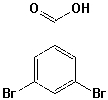


Unlock Deck
Unlock for access to all 48 flashcards in this deck.
Unlock Deck
k this deck
25
Which is the best reaction sequence for preparing the following compound from benzene?
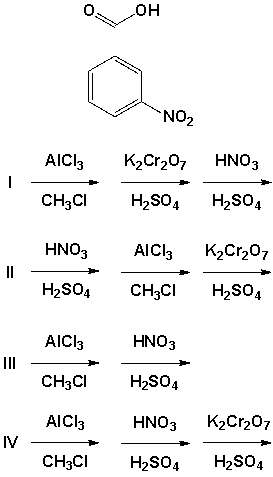
A) I
B) II
C) III
D) IV

A) I
B) II
C) III
D) IV

Unlock Deck
Unlock for access to all 48 flashcards in this deck.
Unlock Deck
k this deck
26
Which is the best reaction sequence for preparing the following compound from benzene? (HINT: consider only the reaction product from electrophilic addition in the ortho position).
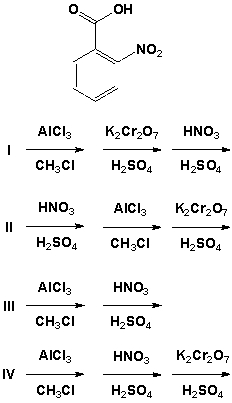
A) I
B) II
C) III
D) IV

A) I
B) II
C) III
D) IV

Unlock Deck
Unlock for access to all 48 flashcards in this deck.
Unlock Deck
k this deck
27
Which is the major product from the following consecutive reactions?
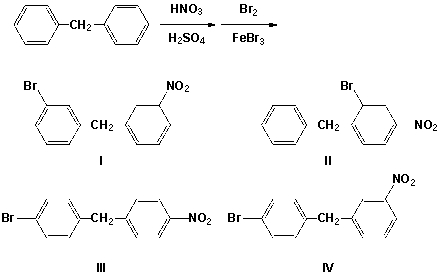
A) I
B) II
C) III
D) IV

A) I
B) II
C) III
D) IV

Unlock Deck
Unlock for access to all 48 flashcards in this deck.
Unlock Deck
k this deck
28
The two major products of the following reaction are?



Unlock Deck
Unlock for access to all 48 flashcards in this deck.
Unlock Deck
k this deck
29
The major product of the following reaction is,
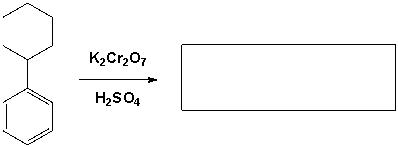


Unlock Deck
Unlock for access to all 48 flashcards in this deck.
Unlock Deck
k this deck
30
The reaction arrows (curved arrows) required to complete the following reaction mechanisms are,



Unlock Deck
Unlock for access to all 48 flashcards in this deck.
Unlock Deck
k this deck
31
Your choice of starting material and reagent that complete the following reaction are?
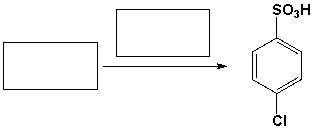


Unlock Deck
Unlock for access to all 48 flashcards in this deck.
Unlock Deck
k this deck
32
Your choice of starting material, intermediate and reagents that complete the following reaction are?



Unlock Deck
Unlock for access to all 48 flashcards in this deck.
Unlock Deck
k this deck
33
Arrange the compounds in order of increasing acidity (least first).
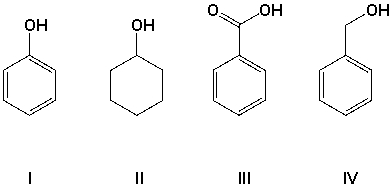
A) I, II, III, IV
B) II, IV, I, III
C) I, II, IV, III
D) II, III, I, IV

A) I, II, III, IV
B) II, IV, I, III
C) I, II, IV, III
D) II, III, I, IV

Unlock Deck
Unlock for access to all 48 flashcards in this deck.
Unlock Deck
k this deck
34
The two major products of the following reaction are ?



Unlock Deck
Unlock for access to all 48 flashcards in this deck.
Unlock Deck
k this deck
35
When one mole of sodium bicarbonate is allowed to react with a mixture of one mole of benzoic acid and one mole of phenol, the major organic products are?



Unlock Deck
Unlock for access to all 48 flashcards in this deck.
Unlock Deck
k this deck
36
Which is the product in the following reaction?
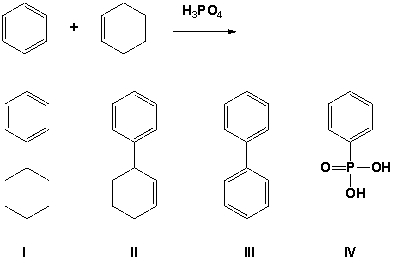
A) I
B) II
C) III
D) IV

A) I
B) II
C) III
D) IV

Unlock Deck
Unlock for access to all 48 flashcards in this deck.
Unlock Deck
k this deck
37
Arrange the compounds in order of increasing acidity (least first).
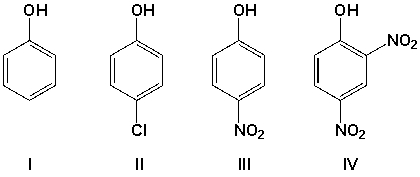
A) I, II, III, IV
B) III, II, I, IV
C) I, IV, III, II
D) I, III, III, IV

A) I, II, III, IV
B) III, II, I, IV
C) I, IV, III, II
D) I, III, III, IV

Unlock Deck
Unlock for access to all 48 flashcards in this deck.
Unlock Deck
k this deck
38
Which is the major product of the following reaction?
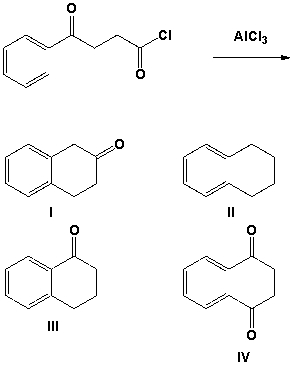
A) I
B) II
C) III
D) IV

A) I
B) II
C) III
D) IV

Unlock Deck
Unlock for access to all 48 flashcards in this deck.
Unlock Deck
k this deck
39
Arrange the compounds in order of increasing acidity (least first).
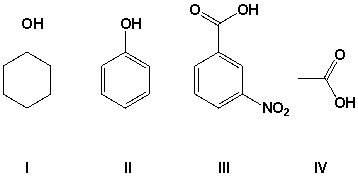
A) I, II, III, IV
B) I, IV, II, III
C) I, II, IV, III
D) II, I, IV, III

A) I, II, III, IV
B) I, IV, II, III
C) I, II, IV, III
D) II, I, IV, III

Unlock Deck
Unlock for access to all 48 flashcards in this deck.
Unlock Deck
k this deck
40
Which of the following properties would allow a student to decide whether an unknown compound was more likely to be para-cresol (para-methylphenol) or benzyl alcohol?
A) solubility in water
B) solubility in aqueous hydrochloric acid solution
C) solubility in aqueous sodium bicarbonate solution
D) solubility in aqueous sodium hydroxide solution
A) solubility in water
B) solubility in aqueous hydrochloric acid solution
C) solubility in aqueous sodium bicarbonate solution
D) solubility in aqueous sodium hydroxide solution

Unlock Deck
Unlock for access to all 48 flashcards in this deck.
Unlock Deck
k this deck
41
The following compounds are listed in decreasing order of reactivity toward electrophilic aromatic substitution.



Unlock Deck
Unlock for access to all 48 flashcards in this deck.
Unlock Deck
k this deck
42
The following compound is aromatic.



Unlock Deck
Unlock for access to all 48 flashcards in this deck.
Unlock Deck
k this deck
43
The following reaction scheme will synthesize the product shown.
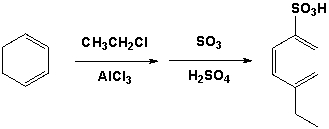


Unlock Deck
Unlock for access to all 48 flashcards in this deck.
Unlock Deck
k this deck
44
The product of the reaction of toluene with concentrated nitric and sulfuric acid is m-nitrotoluene.

Unlock Deck
Unlock for access to all 48 flashcards in this deck.
Unlock Deck
k this deck
45
The following reaction scheme will synthesize the product shown.



Unlock Deck
Unlock for access to all 48 flashcards in this deck.
Unlock Deck
k this deck
46
The following compounds are listed in decreasing order of reactivity toward electrophilic aromatic substitution.



Unlock Deck
Unlock for access to all 48 flashcards in this deck.
Unlock Deck
k this deck
47
The product of the reaction of isopropylbenzene with chromic acid is methylphenyl ketone.

Unlock Deck
Unlock for access to all 48 flashcards in this deck.
Unlock Deck
k this deck
48
The following ion is aromatic.



Unlock Deck
Unlock for access to all 48 flashcards in this deck.
Unlock Deck
k this deck


